The final poll before an election is a good time to remember the caveats that should be applied to all polling:
- Margin of error. (In the case of Lucid Talk 2.3%)
- The time lapse between the poll and the actual vote – during which some voters will change their minds. (In this case three weeks.)
- The don’t knows – who might swing more one way than the other when they actually vote – if they vote at all.
But for all that polls do give us a trend – especially if you compare polls from the same organisation over time.
In the case of the latest Lucid Talk poll for the Belfast Telegraph there is one other important factor to consider. That is that the question asked was about voters’ intentions in an Assembly election, whereas the poll later this month is for local councils where voting patterns are historically different in three important ways.
Firstly, more people vote for Independents in a council election. This can also apply to popular candidates from very small parties. By extension it is reasonable to assume that at the District Electoral Area (DEA) level the strength of individual candidates or of the local campaign can create results out of line with a party’s overall trend.
Secondly, some voters may not necessarily feel the same need to support their ‘designation champions’ as they do in Assembly elections, where the First Minister post is dependent on the result. The best example of this is from 2011 when Assembly and Council elections were held on the same day. Compared to the Assembly results the DUP share was 3.2% lower in the Councils, while the UUP was 1.7% higher. Likewise, Sinn Feín’s vote share was 2.6% lower in the Councils, while the SDLP’s was 0.6% higher. This, or something like it, could happen again. Or it might not.
Thirdly, while a poll may correctly identify voters’ intentions to vote for party X, if party X is not standing in all DEA’s some other party will end up with those votes.
Having stressed all that here are the results of the Lucid Talk poll.
Sinn Feín 29% – up 5.8% on the last Council elections
DUP 25% – up 0.9%
Alliance 13% – up 1.5%
UUP 11% – down 3.1%
SDLP 7% – down 5%
TUV 7% – up 4.8%
Aontú 2% – up 0.9%
Green 2% – down 0.1%
PBPA 1% – down 0.4%
Smaller parties and Independents 3% – down 5.3%
And here are the charts so that you can see the trends:

Sinn Feín will be hoping that their return to their Assembly level of support is just a meaningless variation within the margin of error. In any case, their first preference vote will likely be reduced by support for independent candidates. Nevertheless, all the figures point to them making significant gains later in the month and being the big political story that weekend.
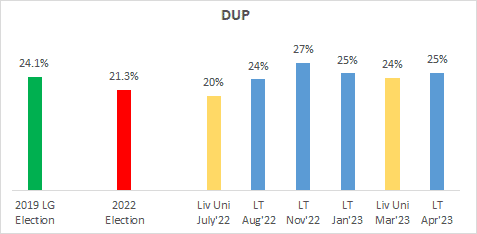
On the face of it this is a worrying showing for the DUP given that their first preference vote could possibly be hit by independents, although there a far fewer minor unionist party candidates this time. They will also be looking over their shoulders at the TUV which seems to be stubbornly holding onto almost all the support it took from the DUP at the Assembly election.
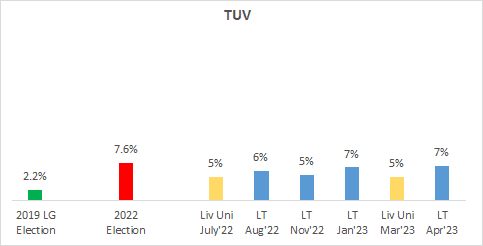
However, there are several DEA’s where the TUV might have hoped to pick up around half a quota where they have no candidate. The DUP will benefit accordingly.
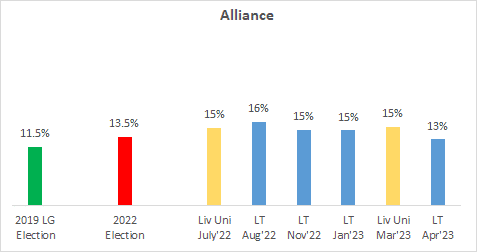
Like SF, Alliance will be hoping that the return to Assembly levels of support in this poll is merely a statistical blip. If not, they will still make gains in the Council elections, but on a more modest level than they might have hoped. Although they might also anticipate that the weakness of the SDLP and UUP will create more transfer opportunities to boost their seat numbers.

There is no silver lining to be found here. Even if the party receives a modest boost due to this being a council election the loss of nearly half their votes points to a rotten time for them at the count. Their transfers will be interesting. Historically they split roughly 50/50 Sinn Feín/Alliance. With the movement of many of their SF leaning voters to SF itself, will SDLP transfers be even more strongly Alliance?
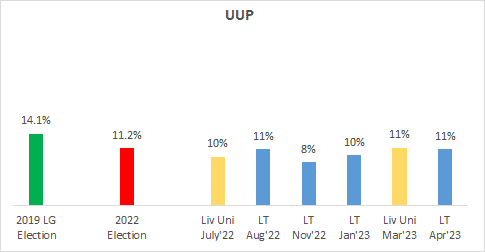
Looked at from an Assembly point of view this is a solid result – but it would not be enough to prevent them losing Council seats – even if they receive a modest bounce because this is a council election. By and large they have been more realistic in candidate selection this year, pruning their historical tendency to run too many candidates, but that can only be of marginal assistance if the vote numbers are falling. Their best hope is that their more modest likely losses are overshadowed by the likely heavier losses for the SDLP and gains for SF.
The UUP transfers will also be interesting. Over the last ten years there has been an increased (although still limited) willingness by some UUP voters to transfer to Alliance, Green or SDLP. With the poll also showing only 16% of UUP voters backing the DUP’s total opposition to returning to Stormont unless the Protocol is scrapped, will fewer UUP voters transfer to the DUP?
For the smaller parties changes are always as likely to be statistical variations as genuine movements in support. But for the record here they are.


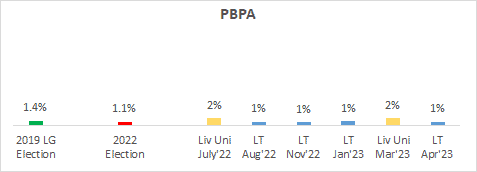
It is hard to read any trend into these poll figures, where the Assembly results may be a better guide. That uncertainty is increased because these parties only contested a minority of the 80 DEA’s last time. The Greens fought 26, Aontú 16 and PBPA 12. We are comparing those results to an NI wide poll.
Michael Hehir is a retired sales and marketing manager. He studied in Northern Ireland but now lives between England and Italy.
Discover more from Slugger O'Toole
Subscribe to get the latest posts to your email.

